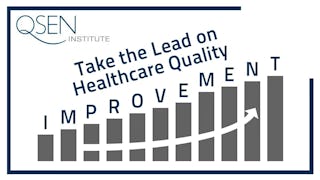Garantir la sécurité des patients et la qualité des soins de santé est essentiel et devrait être une priorité pour tous ceux qui travaillent dans le secteur de la santé. Ce cours propose aux professionnels de la santé et à d'autres personnes une introduction aux connaissances et aux compétences nécessaires pour mener des initiatives d'amélioration de la sécurité des patients et de la qualité aux niveaux micro et macro. Les participants exploreront les fondements de la qualité des soins de santé et la science qui sous-tend la sécurité des patients et l'amélioration de la qualité, concevront et sélectionneront des mesures de soins de santé efficaces, analyseront les problèmes et les processus de sécurité des patients à l'aide d'outils tels que l'analyse des facteurs humains, appliqueront des approches systématiques, y compris le modèle Planifier-Faire-Étudier-Agir (PEEA), pour relever les défis de l'amélioration de la qualité, et apprendront des stratégies pour mener une culture du changement. Le cours adopte une vision mondiale de la sécurité des patients et de la qualité, en reliant les participants à la recherche et aux ressources de l'Organisation mondiale de la santé (OMS), de l'Agence américaine pour la recherche et la qualité des soins de santé (AHRQ), de la Commission mixte et d'autres organisations internationales. Les points forts du cours comprennent des histoires personnelles, des leçons tirées d'autres secteurs et des entretiens avec le président du National Committee for Quality Assurance (NCQA) et d'autres leaders du mouvement pour la qualité. Pawlson, g. & Johnson, J. (2021). Advancing Health Care Quality : Protecting Patients, Improving Lives. DEStech Publications Inc. À propos de l'école d'infirmières de l'université George Washington Classée parmi les meilleures écoles d'infirmières par U.S. News & World Report, l'école d'infirmières de l'université George Washington forme et inspire les infirmières à fournir des soins de santé de haute qualité, centrés sur la personne et empreints de compassion. L'école forme des leaders activement engagés dans la promotion de la santé, la défense des patients et l'innovation en matière de soins de santé, et prépare des formateurs d'infirmières exceptionnels qui recherchent la qualité et font progresser la profession. L'école d'infirmières s'engage à améliorer la santé et le bien-être des personnes et des communautés aux niveaux local, national et mondial. L'école valorise l'apprentissage tout au long de la vie et ses étudiants font progresser la pratique, le leadership et l'enseignement des soins infirmiers tout en faisant la différence dans le monde.

Cultivez votre carrière grâce à des programmes dirigés par des experts, des certificats prêts à l'emploi et des moyens d'évoluer sur 10 000 . Le tout pour 25 $US/mois, facturé annuellement. Économisez


La qualité et la sécurité des soins de santé à l'avant-plan


Instructeurs : Gregory Pawlson
61 345 déjà inscrits
Inclus avec 
(1,409 avis)
Compétences que vous acquerrez
- Catégorie : Leadership et Management
Détails à connaître

Ajouter à votre profil LinkedIn
5 devoirs
Découvrez comment les employés des entreprises prestigieuses maîtrisent des compétences recherchées


Obtenez un certificat professionnel
Ajoutez cette qualification à votre profil LinkedIn ou à votre CV
Partagez-le sur les réseaux sociaux et dans votre évaluation de performance

Il y a 5 modules dans ce cours
Bienvenue au module 1 ! Au cours de ce module, vous découvrirez l'état actuel de la qualité et de la sécurité des soins de santé aux États-Unis et dans le monde, ainsi que les caractéristiques essentielles et les résultats attendus de soins de santé sûrs et de qualité. Nous aborderons également les éléments essentiels de l'amélioration de la qualité et les données nécessaires pour évaluer la sécurité et la qualité des soins. Enfin, nous examinerons les leçons tirées d'autres industries et disciplines qui peuvent être appliquées aux efforts d'amélioration des soins de santé. Nous sommes impatients de commencer !
Inclus
5 vidéos2 lectures1 devoir3 sujets de discussion
Bienvenue dans le module 2 ! Cette semaine, nous examinons l'importance cruciale de la sécurité des patients pour les soins de santé et les sciences qui la sous-tendent. Vous apprendrez un modèle d'ingénierie des systèmes et un processus permettant d'anticiper et de traiter les erreurs médicales. Vous découvrirez également l'importance d'une approche de la prévention des erreurs médicales fondée sur une culture juste.
Inclus
6 vidéos1 lecture1 devoir2 sujets de discussion
Bienvenue dans le module 3 ! Cette semaine, nous nous penchons sur les mesures et l'évaluation. Vous apprendrez à appliquer le cadre donebédien de base pour mesurer la qualité des soins de santé en termes de structure, de processus et de résultats. Nous discuterons des attributs clés des mesures utiles (bonnes) des soins de santé et des concepts fondamentaux de validité et de fiabilité. Vous apprendrez également les éléments les plus importants à prendre en compte lors du choix et de l'application d'une ou plusieurs mesures dans un contexte ou une situation de soins de santé donné(e), ainsi que les principales caractéristiques d'un processus de mesure qui doivent être présentes pour fournir des informations qui reflètent de manière valide et utile la qualité des soins.
Inclus
6 vidéos2 lectures1 devoir2 sujets de discussion
Bienvenue au module 4 ! Cette semaine, vous apprendrez à identifier les possibilités d'amélioration de la qualité et à appliquer le cycle PDSA pour y remédier. Nous discuterons également de l'importance et des avantages des approches d'amélioration de la qualité fondées sur le travail d'équipe, ainsi que de la valeur des technologies de l'information sur la santé (HIT) et d'autres innovations pour l'amélioration de la qualité des soins de santé.
Inclus
6 vidéos1 lecture1 devoir1 évaluation par les pairs2 sujets de discussion
Bienvenue dans le module 5 ! Cette semaine, nous explorons l'importance du leadership dans le soutien et la promotion de la qualité et de la sécurité à tous les niveaux de l'organisation des soins de santé. Nous discuterons des stratégies qui contribuent à une culture de la qualité dans les soins de santé et examinerons différents modèles de changement organisationnel que vous pouvez appliquer lorsque vous dirigez vos propres initiatives en matière de qualité et de sécurité.
Inclus
6 vidéos1 lecture1 devoir2 sujets de discussion
Instructeurs


Offert par
Recommandé si vous êtes intéressé(e) par Gestion des soins de santé


University of Michigan


Johns Hopkins University


Case Western Reserve University


Imperial College London
Pour quelles raisons les étudiants sur Coursera nous choisissent-ils pour leur carrière ?




Avis des étudiants
1 409 avis
- 5 stars
79,30 %
- 4 stars
18 %
- 3 stars
1,98 %
- 2 stars
0,42 %
- 1 star
0,28 %
Affichage de 3 sur 1409
Révisé le 31 juil. 2017
This course give me insight of how to handle hospital quality assurance better in order to improve the hospital performance both from top-down and bottom-up way of management.
Révisé le 16 nov. 2020
Thank you for this program. Both instructors were very engaging and offered a wealth of information. I gave it 4 stars only because some links in the required reading had expired.
Révisé le 26 juin 2021
Extremely educational and beneficial. However, it would be great if some of our questions are actually attended to, gives ones a higher sense of learning. Great work all the same

Ouvrez de nouvelles portes avec Coursera Plus
Accès illimité à 10,000+ cours de niveau international, projets pratiques et programmes de certification prêts à l'emploi - tous inclus dans votre abonnement.
Faites progresser votre carrière avec un diplôme en ligne
Obtenez un diplôme auprès d’universités de renommée mondiale - 100 % en ligne
Rejoignez plus de 3 400 entreprises mondiales qui ont choisi Coursera pour les affaires
Améliorez les compétences de vos employés pour exceller dans l’économie numérique
Foire Aux Questions
Cette activité de formation continue en soins infirmiers a été approuvée par l'Association des infirmières du Maryland, un organisme accrédité par la Commission d'accréditation de l'American Nurses Credentialing Center. Heures de contact de formation continue en soins infirmiers : 10.5.
Les professionnels de la santé souhaitant obtenir les heures de contact de la formation continue en soins infirmiers doivent :
1) S'inscrire au cours et acheter l'option de certificat Coursera de 49 $
2) S'inscrire aux heures de formation continue en soins infirmiers par l'intermédiaire de l'école d'infirmières de l'Université George Washington en suivant le lien ci-dessous. Il y a des frais supplémentaires non remboursables de 60 $.
3) Terminez le cours avec succès. Pour cela, vous devez avoir suivi tous les modules, lu tous les documents requis et obtenu un score de 80 % ou plus à tous les questionnaires.
Inscrivez-vous à la formation continue en soins infirmiers : http://conta.cc/2uePVXA
L'accès aux cours et aux devoirs dépend de votre type d'inscription. Si vous suivez un cours en mode audit, vous pourrez consulter gratuitement la plupart des supports de cours. Pour accéder aux devoirs notés et obtenir un certificat, vous devrez acheter l'expérience de certificat, pendant ou après votre audit. Si vous ne voyez pas l'option d'audit :
Il se peut que le cours ne propose pas d'option d'audit. Vous pouvez essayer un essai gratuit ou demander une aide financière.
Le cours peut proposer l'option "Cours complet, pas de certificat" à la place. Cette option vous permet de consulter tous les supports de cours, de soumettre les évaluations requises et d'obtenir une note finale. Cela signifie également que vous ne pourrez pas acheter un certificat d'expérience.
Lorsque vous achetez un certificat, vous avez accès à tous les supports de cours, y compris les devoirs notés. Une fois le cours terminé, votre certificat électronique sera ajouté à votre page de réalisations. Vous pourrez alors l'imprimer ou l'ajouter à votre profil LinkedIn. Si vous souhaitez uniquement lire et visualiser le contenu du cours, vous pouvez l'auditer gratuitement.
Plus de questions
Aide financière disponible,

